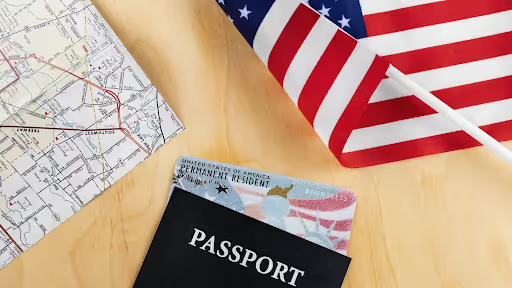.png)
.png)
Get a clear look at EB2 NIW fees, including USCIS filing costs, consular expenses for applicants in Pakistan and India, and extra charges. See if the EB2 NIW cost is worth it and how to budget smartly.

The EB2 National Interest Waiver (NIW) is one of the most flexible U.S. green card options because it allows you to self-petition without the need for an employer sponsor. However, before starting your petition, it’s essential to have a clear understanding of the EB2 NIW fees you will encounter. Knowing the EB2 NIW cost upfront helps you plan your budget, avoid unexpected expenses, and ensure a smoother application journey.
Many applicants underestimate the total cost, assuming only the basic USCIS filing fee is required. In reality, there are multiple layers of fees depending on where you are filing from and whether you choose professional legal support. If you want an in-depth look at the EB2 NIW requirements, timelines, and associated expenses, you can explore this detailed EB2 NIW green card guide.
If you are filing within the United States, the EB2 NIW fees USCIS charges are relatively straightforward. You begin with the Form I-140, which currently has a filing fee of $715. After the I-140 is approved, you move on to Form I-485 to adjust your status, which costs $1,440. In addition, you’ll pay $85 for biometrics so USCIS can complete security and background checks. While waiting for your green card, you may also want to apply for the optional Employment Authorization Document (EAD) and Advance Parole (AP) travel document, which together cost around $260.
Although premium processing is available for some employment-based categories, it’s still limited for NIW cases, meaning you should plan for the standard processing time. For the most accurate and current numbers, always verify directly on the USCIS website.
Many applicants also choose to hire an immigration attorney to prepare a strong case. Legal fees can range between $10,000 and $12,000 depending on the complexity of your profile. While this adds to the EB2 NIW cost, it can prevent costly errors that may lead to Requests for Evidence (RFEs) or delays. To better understand how legal fees work, you can refer to this guide on green card lawyer fees and budgeting.
If you’re unsure how much your specific case might cost, you can request a free estimate from Beyond Border to get a clear breakdown tailored to your situation.
If you are filing from abroad, such as from Pakistan, the EB2 NIW fees extend beyond the USCIS charges. After your I-140 petition is approved, you will complete consular processing, which involves additional steps. You’ll pay the DS-260 visa application fee of $345 to the U.S. Department of State. You must also undergo a mandatory medical examination by a U.S. embassy-approved physician, which typically costs between $200 and $400 in Pakistan.
Furthermore, you’ll need to have all your non-English documents, such as birth or marriage certificates, translated and certified, which can add another $100 to $300. Small but necessary expenses like courier services and currency exchange fees can also accumulate. These additional charges make it important to plan your finances carefully before starting the process.
To avoid delays or mistakes during consular processing, especially if you are unfamiliar with local requirements, it’s often helpful to consult experienced professionals. Beyond Border can guide you through every step if you’re filing from outside the U.S.
Your EB2 NIW priority date is the date USCIS receives your I-140 petition, and it determines when you can move forward with the final steps toward your green card. For applicants from high-demand countries like India and China, visa bulletin backlogs can significantly affect wait times. Longer waits often translate into higher overall EB2 NIW cost because you may need to extend your current visa, maintain legal status, or even incur extra legal and living expenses while you wait.
Some applicants from countries with long backlogs consider switching to EB1, which typically has faster processing. If you’re unsure which option is best for your situation, you can read this comparison of EB1 and EB2 NIW.
Tracking your priority date on the USCIS website helps you plan better financially and avoid surprises during the final stages of your green card process.

Many applicants wonder whether the EB2 NIW cost is worth it, especially compared to employer-sponsored EB2 or EB3 categories. In most cases, the answer is yes. The NIW allows you to self-petition, giving you greater freedom to change jobs or pursue entrepreneurial opportunities without being tied to a specific employer. It’s particularly valuable for highly skilled professionals, researchers, and entrepreneurs whose work benefits the U.S. national interest.
When you weigh the benefits of EB2 NIW against the upfront fees, the long-term advantages—such as more control over your immigration future—usually justify the expense. If you’re still debating between EB1 and EB2 NIW, take a look at this detailed comparison to understand which category better suits your goals.
If you’re ready to evaluate whether EB2 NIW is the right path for you, Beyond Border can provide a free assessment.
There are several ways to reduce unnecessary EB2 NIW fees and avoid costly mistakes. Preparing a strong petition from the start minimizes the risk of Requests for Evidence, which can add both time and cost. Deciding whether to handle parts of the process yourself or seek legal help also impacts your budget; while a do-it-yourself approach may save upfront money, complex cases are often better handled by an experienced attorney to avoid delays.
You can also save on translations and certifications by bundling them with a single provider rather than handling each document separately. Additionally, timing your filing strategically can help you avoid extra living or visa extension costs if you’re affected by priority date backlogs. For more details on the petition process and ways to stay cost-efficient, you can read this guide on I-140 approval timelines and next steps.
If you want a clear, cost-saving strategy for your EB2 NIW application, consulting Beyond Border is a smart first step.

How much does the EB2 NIW petition cost?
It usually ranges from $10,000 to $12,000 including $2,240 USCIS fees, medical exams, translations, and optional legal fees.
Is premium processing available for EB2 NIW?
Mostly no. Premium processing is limited, so most applicants rely on standard timelines. Check the USCIS site for updates.
Are EB2 NIW fees refundable if denied?
No. USCIS filing fees are non-refundable, even if your case is rejected.
What extra costs apply if filing from India or Pakistan?
You’ll need to cover DS‑260 visa fees, medical exams, certified translations, courier services, and currency exchange charges.
Is it worth hiring an immigration lawyer?
Yes, though it increases upfront costs, a lawyer can help avoid delays and RFEs, saving time and money overall.
The EB2 NIW fees may seem like a significant investment, but they open the door to a flexible and self-driven path toward U.S. permanent residency. Whether you are filing from within the U.S. or abroad, understanding the full scope of costs helps you plan your journey effectively. Careful preparation reduces the risk of delays, keeps expenses manageable, and gives you peace of mind during the process.
If you’re unsure where to start, Beyond Border can help you evaluate your eligibility, estimate your costs, and prepare a strong case so you get it right the first time.